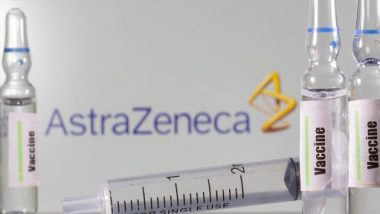London, April 8: The level of risk from an extremely rare form of blood clot being investigated as a possible link with the Oxford/AstraZeneca COVID-19 vaccine is at the same as taking a long-haul flight, the UK health minister said on Thursday.
Speaking a day after the UK's medicines regulator updated its guidance on the vaccine as it further investigates a causal link between the jabs and a very small number of blood clot cases, Health Secretary Matt Hancock stressed that the vaccine – also being produced by the Serum Institute of India – is safe, effective and has already saved thousands of lives.
The minister has been leading a government-wide drive to reiterate the strength of the country's vaccination programme, which he said would remain on track as adults under the age of 30 are offered alternatives in keeping with the updated advice of the Medicines and Healthcare products Regulatory Agency (MHRA). UK Says AstraZeneca Vaccine Will Not Be Administered to Under-30 Yr old Over Blood Clot Concerns.
“The safety system that we have around this vaccine is so sensitive that it can pick up events that are four in a million. I'm told this is about the equivalent risk of taking a long-haul flight,” Hancock told the BBC.
“Anybody who's had the jab should continue with the second jab because there's no evidence of this effect after a second jab and we have more than enough Pfizer and Moderna vaccine to cover all of the remaining 8.5 million people aged between 18-29 if necessary," he said.
The British government has been emphasising that regulators in Britain and Europe have not ordered a halt to use of the vaccine in any age group. Based on the MHRA's updated advice the UK's Joint Committee on Vaccination and Immunisation (JCVI) has now directed that it is preferable for adults aged below 30 years without underlying health conditions that put them at higher risk of severe COVID-19 disease, to be offered an alternative COVID-19 vaccine, if available.
However, the central advice remains in favour of continued vaccinations as the experts concluded that the life-saving benefits of the Oxford/AstraZeneca vaccine continue to outweigh the risks.
According to the MHRA, up to March 31, there have been 79 reports of blood clots accompanied by low blood platelet count in the UK, all in people who had their first dose.
Of these 79, 19 people have died, although it has not been established what the cause was in every case. The 79 cases occurred in 51 women and 28 men, aged from 18 to 79. The risk works out at one in 250,000, or 0.0004 per cent.
It is further probing the very rare and unlikely to occur specific type of blood clot in the brain, known as cerebral venous sinus thrombosis (CVST), occurring together with low levels of platelets (thrombocytopenia) following vaccination with the Oxford/AstraZeneca jab. It is also considering other blood clotting cases (thromboembolic events) alongside low platelet levels.
The expert advice is that these are treatable concerns and anyone who has received the Oxford/AstraZeneca vaccine and displays certain symptoms after four days or more should speak to their doctors.
These symptoms include severe headache, blurred vision, chest pain, leg swelling, shortness of breath, persistent abdominal pain or unusual bruising. The advice for anyone who experiences blood clots and low levels of platelets after their first dose is that they should not have a second dose.
It comes as the latest government-back study of coronavirus cases within the community, led by Imperial College London, found that infections are levelling off. The Real-time Assessment of Community Transmission (REACT) found that infections are now leading to fewer hospital admissions and deaths, which likely reflects the impact of the vaccination programme. COVID-19 Vaccination: 7 Blood Clot Deaths in UK After AstraZeneca Jab.
“We are seeing that the vaccine is working. It's breaking the link between cases and deaths," added Matt Hancock. Meanwhile, a University College London analysis indicates that the number of people who have protection against the deadly virus, either through vaccination or a previous infection, is set to hit 73.4 per cent on April 12 – a level seen as enough to tip the country into so-called herd immunity.
France and several other European countries have stopped offering the AstraZeneca vaccine to people aged under 55 or 65, while Denmark and the Netherlands have paused its use entirely. Germany has retained its advice not to offer it to people under 60. It follows the European Medicines Agency (EMA) concluding a “possible link” between the vaccine and rare blood clots.
(This is an unedited and auto-generated story from Syndicated News feed, LatestLY Staff may not have modified or edited the content body)












 Quickly
Quickly




















